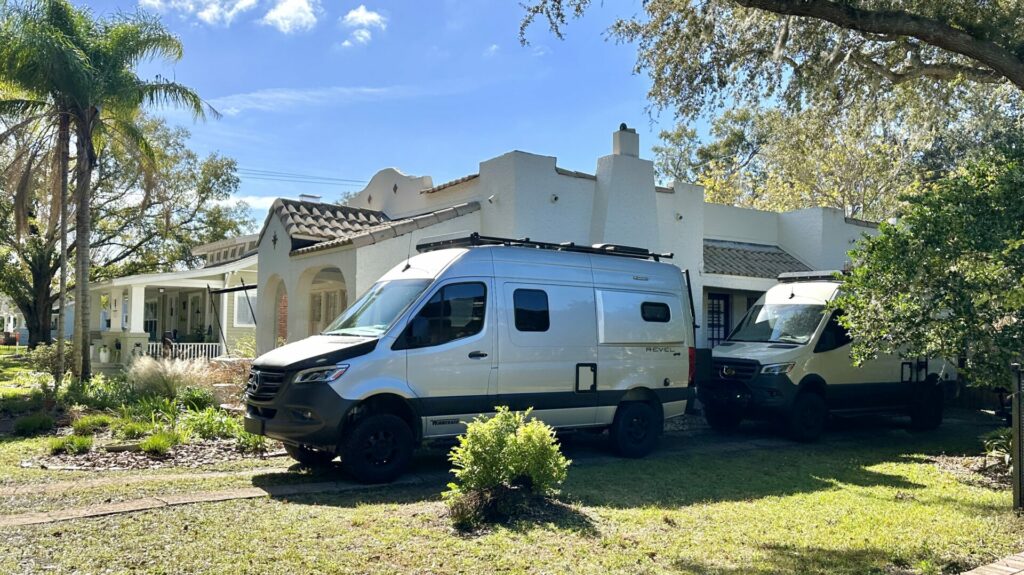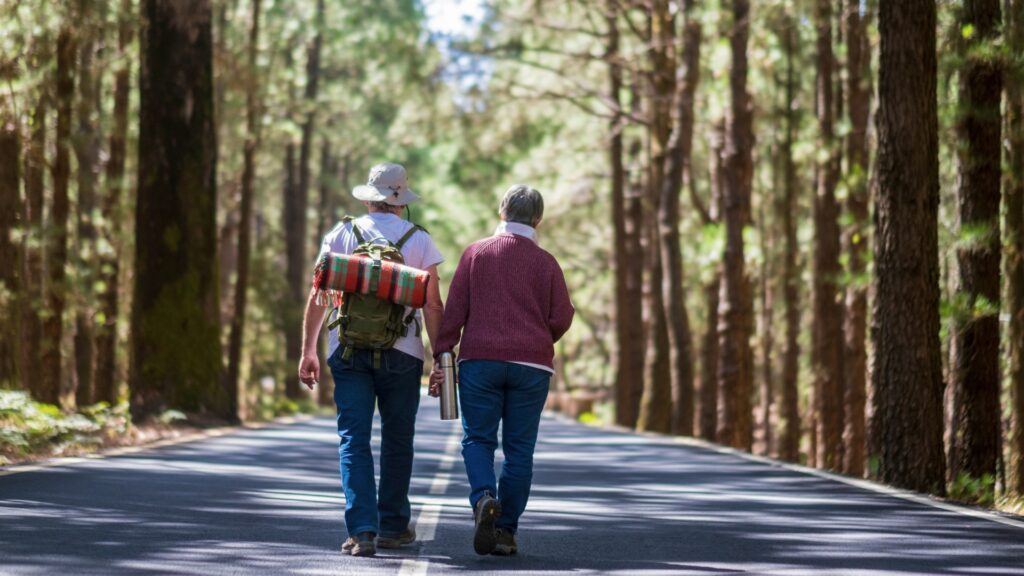Table of Contents Show
Many full-time RVers set out planning to enjoy the lifestyle for the rest of their lives. However, that’s typically not how things always end up happening.
In reality, most people in these situations spend two or three years adventuring before settling back into a sticks and bricks house. Unfortunately, the adjustments can be complicated without a proper exit plan.
Today, we’re sharing some exit plans from real RVers and tips we’ve learned from no longer being full-time RVers.
Let’s get started!
A member of a massive full-time RVing Facebook group recently asked the community about their RV exit plan.
The post generated almost 200 comments and revealed a lot about what members of the RV community think about the future. While many stated they didn’t have an exit plan, it was good to see that a decent amount did.
What is an RV Exit Plan?
An RV exit plan is a strategy or arrangement to help transition from the full-time RV lifestyle. These plans can help ease the burden many experience when leaving their nomadic life behind.
Many find that transitioning out of the lifestyle can be more complicated than embracing it initially. While some nomads jump head-first into RVing and figure it out, it can be more complex when leaving it behind.
A proper RV exit plan will include detailed plans, financial considerations, and the logistics for future housing. The more intricate the plan, the smoother the transition can be.

Why Do You Need an RV Exit Plan?
Even if you don’t plan to stop RVing any time soon, it’s a good idea to have a basic RV exit plan. You never know when your life circumstances will change, and you must come off the road.
We’ve met many fellow full-time RVers who said they were in it for life, but an unexpected life event quickly changed those plans.
As mentioned, coming off the road is often more challenging than becoming a full-time RVer. There are a lot of hurdles that you’ll have to conquer, and many of them are out of your control. Not having an RV exit plan can make it much more challenging to make the transition.
If you thought adapting to RV life was challenging, try exiting the lifestyle without a plan. Everything from finding housing to selling your rig can take time, energy, and money. Depending on your situation, some or all of these may be in short supply.
Pro Tip: If you’re still unconvinced, read our full article on Why You Need an RV Exit Plan.
RV Exit Plans From Real RVers
While there were almost 200 comments, we noticed a few common themes. Many of the commenters could be put into a handful of categories. These were some of the group’s most popular RV exit plans from real full-time RVers.
Travel Until They Die
Several people commented on the post, stating that their RV exit plan was to travel until they died. While this may sound like a good idea or possibility, it’s not likely for most RVers.
Even if you’re stationary, RVing can be physically demanding. If this is your exit plan, you may want to reconsider.
Recreational vehicles often tremendously lack insulation. Depending on your location, this can make summers and winters miserable experiences. Sure, some people will live out their final days in their RV, but most will abandon it long before that point.
Even though many of the commenters said this was their RV exit plan, we don’t find it to be realistic.

Acquire Land to Create Homebase
One of the most popular responses was from individuals looking to purchase land or create a home base. Their goal is to create a place where they can park their rig and settle down for the time between adventures. They’ll be able to live comfortably and have a place to retreat to when they’re not traveling.
Many were inspired to make this change when 2020 forced everyone to stop traveling. Many nomads who had sold everything to hit the road quickly discovered the importance of owning land or having a home base.
Use the Camper as a Rental
The RV industry saw a tremendous explosion in RV sales from 2019 to 2023. As a result, many owners paid premium prices for new and used rigs.
Unfortunately, now that demand has cooled, prices are starting to decrease. As a result, we’re seeing more and more RV owners underwater on loans.
With few other options, many plan to rent out their rigs through Airbnb and other online platforms. This allows them to continue to own their recreational vehicle and pay down their loans. Even if they’re not underwater, it can be a great way to make a little money when you’re not camping.
Pro Tip: Do you know if You Can Rent-to-Own an RV?
Purchase a Home in a New Town
Others were planning to make the decision we made. When we hit the road years ago, we were residents of California. While we still have family in the Golden State, we opted to buy a home and settle in a completely new area. After traveling and seeing most of the country, we settled in Florida.
While others choose other parts of the country, many use their travels to find the perfect spot to call home. Their RV exit plan is to keep traveling until they find that place. When they do, they’ll figure out the rest.

Tips for Creating an RV Exit Plan
While every RV exit plan is unique, there are some essential things you need to consider. The more thought you put into it, the smoother the transition. Here are a few tips to help you create your RV exit plan.
Decide If You Want to Sell Your Home
One of the biggest mistakes many RVers make is selling their home before hitting the road. While this can give you a stack of cash to help fund your adventures, homes are valuable assets.
If possible, it’s often best to rent out your home so you have a place to return to when you’re done RVing. Your renters can pay your mortgage while you make priceless memories with your loved ones. Again, while you may plan to leave residential dwellings behind for good, that’s often not how things end up.
Understand That Depreciation Hits RVs Hard
Another major mistake that you want to avoid is underestimating depreciation. Compared to most sticks and bricks homes, RVs typically depreciate very quickly.
Depending on the type of RV and features, they can lose as much as 30 to 50% of their value in a matter of years. This can become a serious problem, especially if you didn’t put a large down payment on your rig.
Depreciation is one of the biggest reasons many owners find themselves underwater on their loans. This is especially true now as many owners paid premium prices, and the demand has cooled significantly. Many owe as much on their two-year-old model as the MSRP on current-year models.

Have an Exit Plan Savings Account
When we decided to stop traveling full-time, we quickly discovered the importance of having an exit plan savings account. Whether you plan to rent or buy, you’ll need a decent amount of cash.
Renting often requires a hefty security deposit and your first month’s rent. Depending on where you’re renting, this can be thousands of dollars.
You’ll likely purchase furniture, set up utilities, and have various other random expenses. You also can’t count on your RV selling quickly, which may mean paying for it to sit in storage. You’ll also have to continue paying your loan until you find a buyer.
Pro Tip: Here are 5 Reasons Why We’re Glad We Quit Full-Time RV Life!
Enjoy Every Moment
Whether you end up RVing for the rest of your life or just a period, the most important thing is that you enjoy every moment. Before coming off the road, allow yourself to reflect on your adventures.
Since you may not always be able to do it, take the time to see any destinations or do any adventures you’ve always dreamed of.

Learn from Others When Creating Your RV Exit Plan
Full-time RVing can be an exciting way to live. However, it’s not forever for most people. Most RVers do it for a few years before settling back down. No matter your situation, take the opportunity to learn from others and create a quality RV exit plan. You’ll be glad you did, especially if you make a tough decision or plans change and you have to come off the road.






